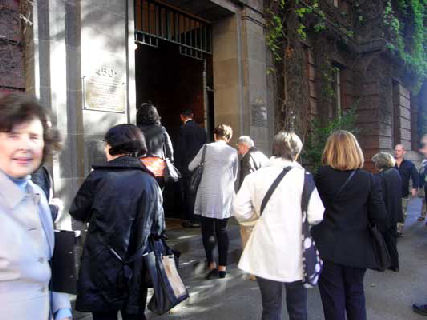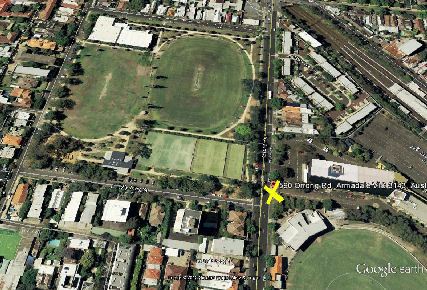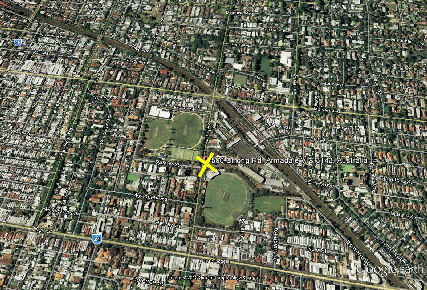 "An amazing start to the supreme court case. It was a packed courtroom with standing room only, more than 100 of you came to show resident opposition to VCAT saying that our objections don't count. The outcome of this hearing will affect us all. Barrister Stuart Morris presented the case for the council. It has been suggested that if this case goes against the people that people should write to the Attorney General demanding that VCAT be abolished and they set up a proper simple appeal body for planning issues. The hearing continues tomorrow, Wednesday, and the barrister Chris Canavan will be speaking for the developer. If you have time do go to hear what he has to say for the developer. " (Mary Drost of Planning Backlash).
"An amazing start to the supreme court case. It was a packed courtroom with standing room only, more than 100 of you came to show resident opposition to VCAT saying that our objections don't count. The outcome of this hearing will affect us all. Barrister Stuart Morris presented the case for the council. It has been suggested that if this case goes against the people that people should write to the Attorney General demanding that VCAT be abolished and they set up a proper simple appeal body for planning issues. The hearing continues tomorrow, Wednesday, and the barrister Chris Canavan will be speaking for the developer. If you have time do go to hear what he has to say for the developer. " (Mary Drost of Planning Backlash).

Stonnington City Council v Lend Lease Apartments (Armadale) Pty Ltd & Ors.
Well, an interesting day at the Supreme Court, conducted at the High Court building. This was the third venue given since the day before. Nonetheless the court room was packed, with standing room only for about 8 people, others sitting on a table at the back and another 8 or so allowed to sit in the jury box.
Another consequence of privatisation
 You could say that all the trouble started with the privatising of public land, involving a building and site that used to belong to state water, which was later purchased by a corporation. Now, years down the track, Lend Lease and a partner want to build a series of massive towers on this site which seems to be located between two areas of parkland in an area largely without other green open space.
You could say that all the trouble started with the privatising of public land, involving a building and site that used to belong to state water, which was later purchased by a corporation. Now, years down the track, Lend Lease and a partner want to build a series of massive towers on this site which seems to be located between two areas of parkland in an area largely without other green open space.  Stonington Council, represented by barrister Stuart Morris, was appealing a decision by VCAT which gave the green light to Lend Lease to build - if I heard correctly- at least 19 buildings ranging in size with 11 to be of 4-12 stories on or adjacent to parkland in a neighborhood where the highest residential buildings are around two or three stories. Naturally the community objected. There were a total of around 618 or 627 objections and only 3 letters of support for the project. However, despite this manifest opposition to an obviously disruptive development:
Stonington Council, represented by barrister Stuart Morris, was appealing a decision by VCAT which gave the green light to Lend Lease to build - if I heard correctly- at least 19 buildings ranging in size with 11 to be of 4-12 stories on or adjacent to parkland in a neighborhood where the highest residential buildings are around two or three stories. Naturally the community objected. There were a total of around 618 or 627 objections and only 3 letters of support for the project. However, despite this manifest opposition to an obviously disruptive development:
"VCAT, in its determination of 10 July 2012 to grant, in full, Lend Lease’s Planning Permit Application, ruled that the extent of the community’s opposition to a planning application was irrelevant. “We (VCAT) are exercising an administrative review power. It must be exercised in accordance with law. We must not have regard to irrelevant considerations. The extent of the opposition per se in one of these” – i.e. irrelevant.[Source: http://www.orronggroup.com/]
Whereupon:
"Stonnington Council, with support of the Orrong Group, recognised the implications that such a ruling would have on all planning applications for all Victorians. Council has succeeded with the first stage of the appeal – the Supreme Court [...] granted Council the right to appeal the matter to the full court on Tuesday16 April."
The Orrong group say, rightly:
The Council is commended for taking this brave step. Because of the widespread ramifications of the VCAT ruling this is a case that justifies the cost of the appeal. It has the possibility of being a “watershed case”. We must support the Council in its action."
The whites of their eyes
We are supposed to live in a democracy. A 'democracy' implies self-government and control over what happens in one's community. But reality in Victoria (and the rest of Australia) is that the corporate sector has far more influence over government than the people and usually wins over real communities. This is becoming more and more problematic in Australia, as open space becomes a civil battle field because of government- and corporate- engineered population growth that is driving unwanted development everywhere.
Economic theory behind our predicament
It takes being caught up in the undignified, expensive and painful reality of turbo development for people to begin to grasp just how mad our laws are and how weak our democracy. You can spend a lot of time trying to argue sensibly, writing submissions and getting nowhere. Meanwhile some corporation is making a lot of money out of your misery. The economic theory behind this goes back to the 18th century in Britain, the time of the Restoration, where a particularly predacious kind of land-tenure law replaced an earlier kind that gave people more rights. Although enclosures had happened since the time of the Normans, the 18th century was particularly fierce.
“In the eighteenth century, when the British economy entered an unparalleled era of expansion, Britain’s Parliament began operating according to Coasian principles and reorganized property rights en masse. In the nineteenth century, when most common-law doctrines reached their modern form, doctrines of equity (enforced through the Chancery Court) dominated the conveyance of land. These doctrines were designed to protect beneficial interests, not to maximize productivity. Efficiency became a dominant doctrine in the English legal system only after Parliamentary intervention.”(Source: Bogart, Daniel E. and Richardson, Gary, 2008, June. "Making Property Productive: Reorganizing Rights to Real and Equitable Estates in Britain, 1660 to 1830."NBER Working Paper No. W14107, p.7)
Coasian economic theory was originated by Ronald H. Coase in “The Problem of Social Cost”, Journal of Law and Economics, 3: 144, 1960. The theory assigns value arbitrarily, according to the highest dollar profit probability. It takes no heed of non-monetary values and therefore is unresponsive to social cost or individual equity. [Extracts from book close to publication: Sheila Newman: Demography, Territory, Law 2: Land Tenure and the Origins of Capitalism in Britain, Countershock Press.] And that is the key: Coasian economics takes no heed of non-monetary values and therefore is unresponsive to social cost or individual equity This works out to mean that big business can almost always claim to be benefiting the community because of large financial through-puts, and that residential or small business objectors are NIMBYs, with much lesser financial sums at stake. This method of appraisal of a situation almost completely ignores every non-monetary interest affected and lesser monetary interests of small businesses. Residents cannot claim financial costs that might be incurred, for instance through loss of sunlight rendering solar panels useless or vegetable gardens unproductive.
Importance and Elements of this case
So this case begs those conventions that dispossess us of our individual rights to enjoy our properties and our neighbourhoods and participate in local self-government - the very essence of democracy. Below I list some of the issues I understood from Barrister Stuart Morris's arguments, which occupied most or possibly all of the first day. [Candobetter did not remain for the rest of the day and supposes that the Lend Lease barrister (Chris Canarvan) will present his case tomorrow.] - Stonington Council had unanimously vetoed the Lend Lease project after receiving approximately 620 objections - The parties to the proceeding should be taken to include people who made petitions, including those who were did not come in to the tribunal. The responsible authority must consider all objections not withdrawn. -It must consider environmental impact and any significant social and economic effects. Environmental impact, particularly under the Planning and Environment Act could extend well beyond the immediate neighborhood. - Participation is a key factor: The Tribunal must where appropriate take account of the extent of which persons owning land nearby participated in the decisions before granting the permit. It was suggested that this provision carries over from an older Act which actually goes back itself to the Planning Appeals Board Act 1980. It's all about participation. John Caine's (Victorian Premier from 1982-1990) ammendments in parliament form some of the history of this part of the law. - In case the defendants seek to narrow the scope and leave no room for the actual operation of the principle, the scope has to be broad, the triggers to be generic in nature. - The Tribunal is required to consider all objections. - The substance of the objection can be important - The number of objections can be important - The number of objections plus the substance is relevant to the purpose of the Act to include embracing public participation and fairness - There needs to be ability to participate in the objection procedures (noting the fact that it is commonplace for applicants to be exempt from third party rights and therefore not to advertise their projects) - The fact of participation is crucial - The extent to which persons participate makes relevant the number of persons who participate - Evidence of social effects: suggestion that one is not lawfully considering a matter if one excludes the number feeling strongly enough to object - There has been an error of law when a party who has made a written submission is ignored. - A planning decision is informed by the degree of community response which may still be relevant if not determinant The above points are a very sketchy rendition of some very detailed citations and arguments made over the course of several hours. The case continues on the 17th of April at the same venue. The counter arguments of the Lend lease barrister will then be heard. Candobetter.net is interested in receiving opinions and notes on tomorrow's presentations.
Details of court and case
Supreme Court List for Wednesday, 17 April 2013 Hearing commences at 10:30 AM, but be there at 10:00AM. 1 Court 2, Ground Floor Old High Court 450 Little Bourke Street, Melb. Justice Emerton Valuation Compensation and Planning List Stonnington City Council v Lend Lease Apartments (Armadale) Pty Ltd & Ors.

Comments
Bandicoot
Fri, 2013-04-19 11:10
Permalink
Comment posted at the Orrong Group's page
Anonymous (not verified)
Sun, 2013-04-21 08:15
Permalink
No comment on population growth
I left a comment on this page, mentioning that population growth must be addressed to prevent overdevelopments and the spill-out that will ultimately destroy Melbourne. They didn't publish it! Maybe this Orrong group are a group of NIMBYs - happy to protect their own back yards, and send the developments somewhere else - but not prepared to look at the whole problem State-wide.
Editor's comment:
Firstly, my apologies that dealing with spam comments has prevented from aprroving this post until now (11:38am on Sunday 21 April 2013)
Thank you, firstly for making the comment above and secondly for advising us that your comment was not published. This is one feature of much of the supposed 'alternative' Internet that corrupts the World Wide Web (www) and prevents the Internet/www from becoming as effective a safeguard of democracy and peace that it might otherwise be: that posted comments are not only censored, but censored in a manner that is not even transparent. Other site visitors, particularly those who agree with your views are not even made aware that others might share their views. The time has long since past when a site should have been set up to blow the whistle long and hard on such sites. (Just possibly, the non-publication of your comment may have been due to oversight or because of the actions of one person who may be censoring at his/her own behest. In time we will know one way or the other.) In the meantime, we could use your post as a start of a more methodical response to censorship on candobetter.
By the way, except for spam and a very few posts which contain material, which is illegal, we have never censored any comment from candobetter. Unlike many other supposed 'alternate' web-sites, our views, many of which are contrary to supposed conventional wisdom, are based on evidence and logic and can be shown to be such through debate with detractors (and were someone ever to show that any view was not, we would soon change our view.)
Sheila Newman
Sun, 2013-04-21 13:46
Permalink
Retraction and Apology to Dr Jeff Yugovic
Dr Jeff Yugovic felt that the title supplied by Candobetter Admin to an article written by Hans Brunner (biologist) about an article published elsewhere by Dr Yugovic misrepresented Dr Yugovic's intentions in the latter article which was about introduced predators and local populations of indigenous animals (“Ecosystems need predators” in Indigenous). Dr Yugovic pointed out that, where Mr Brunner had argued scientifically, an anonymous comment and the title (and possibly the 'teaser' of the article - not written by Mr Brunner) implied or made assertions which Dr Yugovic felt were not actually supported by his article. Apparently Dr Yugovic and or a community group attempted to get this point of view across to candobetter.net editors but their comment was not published. Eventually I was contacted about this matter by phone. I am really sorry that those concerned had to go to such trouble. When I looked for it I could not find the comment they had tried to submit and I think this was almost certainly because of the enormous volumes of SPAM candobetter has been dealing with since its upgrade to Drupal 6.5, which seem to mean that, no matter how much we try to read everything carefully, we still finish up deleting bona fide comments.
Below is Dr Yugovic's letter.
Letter to Admin, We Can Do Better
14 April 2013
Please remove your Admin post titled ‘Australian botanist wants more foxes, cats and dogs’ and the comment post ‘Easy to blame the victims’ – they are offensive and misrepresent me.
Please post an apology or retraction regarding these libellous posts.
These posts have deliberately misinterpreted my article without asking me to provide comment.
In the event that you do not remove the posts and replace them with a retraction or apology, I will have no option but to refer this matter to my legal team.
Yours faithfully
Jeff Yugovic
I would like to invite Dr Yugovic to submit comment for publication again if he wishes. I would be happy for him to contribute beyond this, perhaps elaborating his argument about introduced predators and indigenous prey and his evidence and findings regarding the interaction between vegetation and species in the disrupted ecology on the Peninsula within the context of human population growth and infrastructure expansion.
I hope to republish Hans Brunner's article with another less offensive title and introduction, by and by, especially after I have reread Dr Yugovic's article. I am also keen to publish any further response from Dr Yugovic on this and anything else to do with the predicament of fauna and flora on our human-overpopulated Mornington Peninsula.
Candobetter.net DOES uphold a principle of people being able to defend their views and to write on any level without regard for popularity or any particular demographic. Where writers hold views antithetical to those we espouse under the rubric of 'A website for reform in democracy, environment, population, land use planning and energy policy' that does not mean we will not publish them. We may prefer to publish them (in full) as comments if they are advocating growth in human population and economic through-put, but we won't censor them [except where they break laws such as those against incitement to violence].
If writers have difficulty getting through to us lately (due to the problem of SPAM, which we will overcome eventually) please ring us at the contact number supplied under 'Contact' at the top left hand of this page and we will give you an email address.
Truth through Controversy is a major motto for candobetter.net but we do not aim to misrepresent.
Apologies again to Dr Yugovic.
quark
Thu, 2013-09-19 11:06
Permalink
Case dismissed in Melbourne Supreme court today
nimby
Thu, 2013-09-19 11:44
Permalink
Democracy is "irrelevant" in Victoria
Add comment